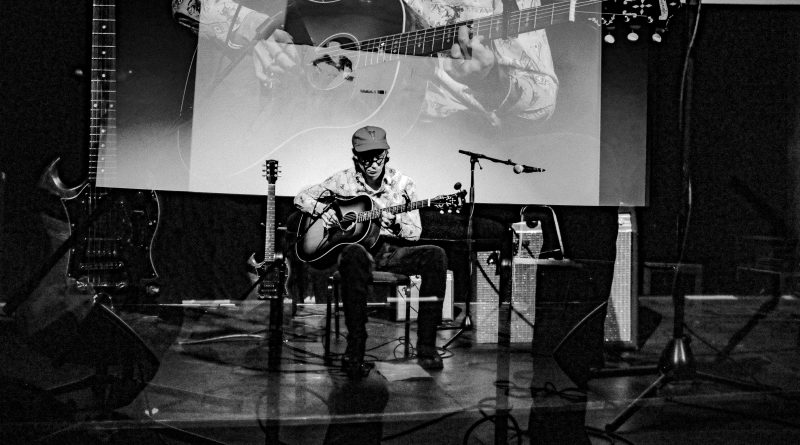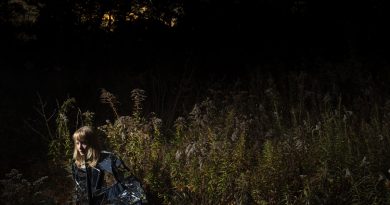PHOTOS AND REVIEW: Hayden Pedigo at PhilaMOCA
Follow WHIP Twitter Facebook Instagram
WRITTEN BY: Erika Cutaia
Hands are the most telling parts of the human body because they hold secrets. I failed to consider how much emotion and history they could convey until Hayden Pedigo’s December 12th show at PhilaMOCA. Each pluck unraveled soundscapes of his memories and heart, and Pedigo proved an authentic and honest story-teller, focusing on his fingers with fastidious care throughout the night.
The first time I heard Hayden Pedigo was when I listened to “Carthage,” off his latest release, Letting Go. Immediately, I cried. It created a symbolic soundscape of an exact place I used to retreat to when I lived in a small town—a desolate, secret cornfield. I knew that Pedigo was capable of magic, using soundscapes centered around his origins in Amarillo, Texas to transport the audience from one habitat to the next. Though this was his first time in Philly, when comparing his prior show in New York, he commented, “I didn’t feel at home in New York…and…when I came here, I felt more at home.” This captures the heart of the performance: an exchange of homes.
As I entered the intimate PhilaMOCA, not many others had arrived; a few were mingling, Pedigo was there by himself in a corner, and there was someone in the back donning face paint reminiscent of Pedigo’s “Letting Go” music video. Though by looks alone one might assume black metal music would be his genre, in extreme contrast, Pedigo creates American primitive instrumental solo guitar pieces.
First, Philly instrumentalist Nick Millevoi took the stage (his first solo show in two years) and the light chatter diminished as the classic PhilaMOCA lighting set in: a dreamy haze of hues projected by a screen that creates a shadowy silhouette of the performer. Millevoi began the night with an explosion, shredding with electronic sound, building a wall with loops and pedals, as more people started to trickle into the venue. The second song, an old track from his past band, Many Arms, titled, “Beyond Territories,” sucked the audience into what felt like a pit of anxiety that you could not escape. The abrupt, jarring stroke that Millevoi employed at the end clipped the abrasive thunder, making the audience wonder if and when the walls of sound would suddenly crash. After the pit of anxiety he created, Millevoi calmed and mellowed racing hearts with his soft, luring rendition of a Todd Rundgren song, scraping back the wall with the beautiful light tapping of his fingers hitting harmonics on the guitar. Concluding with a jazz-influenced piece, Millevoi made his way off the stage, telling the audience to “hold on to their hats” and thanking them for coming.
Pedigo then began to set up with help from Millevoi; when ready, they fist bumped. He took the stage borrowing Millevoi’s Gibson SG guitar (which he had never played before) and began his gentle fingerpicking of “Some Kind of Shepard”—a lightness and a breeze swooping into the venue—followed by “Tints of Morning”—painting imagery of a warm sunrise shining in one’s eyes after waking. He shut his eyes to channel textured landscapes through his hands, each finger a different sound creating geography, and he transported the audience back to where he wrote the song. After these relaxing tracks, Pedigo added weight with one of the most notable songs of the night, “Rained Like Hell.” Pedigo apologized to the crowd saying it would be a bit of a slow burner, but audience members gave an attentive gaze and were stunned in silence, a trance that proved a mutual agreement of gladness, for they did not want the song to end. The piece was a journey through a storm, starting soft but growing louder as the rain got heavier, until eventually the audience was soaked wet in his strums of guitar, the water dripping from his fingers. There was a slight pause in the middle (a breath of reflection), but nobody clapped, knowing it was not over (they were reflecting as well). Pedigo said he was sorry for making us sleepy, but the dreamy haze he put us in was the place to be.
Next, Pedigo switched to his acoustic guitar, lightening the mood by making the crowd laugh and joking about the mini plastic hands that he would use as finger picks. When Pedigo offered dialogue, it felt like a room full of friends recalling stories to catch up. Pedigo said himself, “It feels like I’m playing to friends because I am.” There were moments of gentle whispers and teary eyes.
Playing “Something Absolute,” Pedigo revealed:
This song to me is kind of just the sound of driving through the Texas Panhandle. It’s really flat. There’s not much to look at. In the past I’ve struggled with stage fright. I’ve had trouble traveling, but because of this record I kind of was just like, you know, I’m gonna go out of my comfort zone and travel. So when the record came out, me and a buddy drove all the way up to Nashville and we…[were] just surrounded by trees all around…and I got kinda really claustrophobic by it…We finally were getting back into the Texas Panhandle and the flat…and I kinda started crying because I could breathe. So this song is kind of my ode to the flatness and the joy it brings and the sadness it brings and all the in between.
Second to last was the song titled “Madrid”—named after a place—which is a cliche Pedigo scoffed at. But as he stated, “All the things we hate, we do ourselves.” He explained that “Madrid” is an ode to his honeymoon with his wife; they had little money then. After the conclusion of “Madrid,” he ended with his most tranquil piece, “I Wasn’t Dreaming.” When it was all over, audience members snapped out of the haze in an excited swift shuffle to the merch table to try and grab a copy of the last five records Pedigo had.
Throughout the night, Pedigo’s fingers acted as footsteps, each pluck one step forward into the expansive landscapes he created, leading the audience along the walk. It was a night filled with hypnotic transformation, not just a living and breathing collection of Pedigo’s spaces, but a space for everyone to imagine their own version and recall their own memories: to feel connected to the ethereal guitar that drove the crowd down the Texas Panhandle in a warm, windswept haze.













